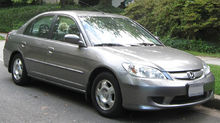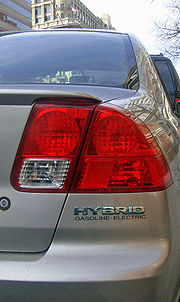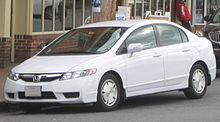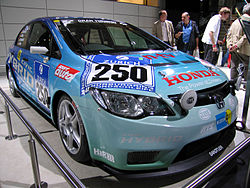- Honda Civic Hybrid
-
Honda Civic Hybrid 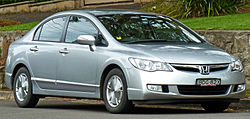
Manufacturer Honda Production 2001–present Assembly Suzuka, Mie, Japan Class Compact car Body style 4-door sedan
5-door hatchback (2012-, Europe)Layout Front-engine, front-wheel drive Related Honda Civic The Honda Civic Hybrid is a hybrid powertrain version of the Honda Civic, first introduced in Japan near the end of 2001. It comes with either a continuously variable automatic transmission or (until 2005) a 5-speed manual transmission. It uses an Integrated Motor Assist hybrid system similar to Honda Insight. The Civic Hybrid is only available as sedan, even in Europe until 2012, where it is replaced by its hatchback version.[citation needed]
The Civic hybrid was introduced to the U.S. in spring 2002 as a 2003 model, based on the seventh generation Civic. As with the conventional Civic, it received a styling update for 2004. It is the first hybrid vehicle to be certified as an Advanced Technology Partial Zero- Emissions Vehicle (AT-PZEV) from California's Air Resources Board. The second generation Civic Hybrid is based on the eighth generation Civic, with some styling differences between the U.S. market and Japanese market models. The Civic hybrid ranks as the second best selling electric hybrid car in the U.S.[1] As of the end of January 2009, the total global sales of all Civic hybrid exceeded 255,000.[2]
Contents
First generation (2001–2005)
First generation 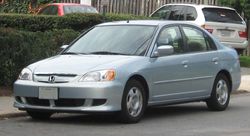
Production 2001–2005 Model years 2003–2005 (U.S.) Engine 1.3 L LDA series I4 SOHC Transmission 5-speed manual
CVTWheelbase 103.1 in (2,619 mm) Length 2003: 174.6 in (4,435 mm)
2004-05: 175.4 in (4,455 mm)Width 67.5 in (1,715 mm) Height 2003: 56.7 in (1,440 mm)
2004-05: 56.3 in (1,430 mm)Related Honda Civic Main article: Honda Civic (seventh generation)The Civic hybrid, based on the seventh generation Civic, was first introduced to the Japanese market in December 2001. Honda claimed it was the most fuel efficient 5-passenger gasoline-powered production vehicle in the world at the time.[3] It was introduced to the U.S. in spring 2002 as a 2003 model. It is the first hybrid vehicle to be certified as an Advanced Technology Partial Zero- Emissions Vehicle (AT-PZEV) from California's Air Resources Board.[4]
Design
The first generation of the Honda Civic Hybrid was based on the seventh generation Honda Civic. It was the first mainstream vehicle from Honda equipped with a gasoline-electric hybrid system and became the second hybrid model of the company after Insight. Model with manual transmission was rated 46 mpg city / 51 mpg highway according to United States Environmental Protection Agency (EPA) fuel mileage estimates,[5] about the same combined mileage as for the Toyota Prius, and became the most fuel-efficient five-passenger sedan ever sold in North America at the time.[6]
The following is a list of its technical features[7] [8] [9]:
- Twin spark plugs light the lean fuel-air mixtures sent to the two-valve combustion chambers.
- 1.3 liter single overhead cam i-DSI lean-burn internal-combustion engine with VTEC Cylinder Cut-off System, which allows three cylinders to deactivate during deceleration. The engine generates 85 hp at 5,700 rpm and 87 ft·lbs of torque at 3300 rpm.
- features idle stop. When stopped at traffic light, the engine shuts off automatically, then restarts immediately when the driver takes their foot off the brake, contributing to both greater fuel efficiency and lower emissions.
- 10 kW (13 hp) brushless, permanent magnet assist motor, which functions as a generator during deceleration recharging the batteries (regenerative braking).
- Combined output of both engine and electric motor is 93 hp at 5,700 rpm. Maximum torque is rated 116 ft·lb at 1,500 rpm for manual transmission models and 105 ft·lb at 3,000 rpm for CVT models.
- 144 V Nickel-metal hydride batteries with 6.0 A·h capacity.
- Honda Multimatic S continuously variable transmission or 5-speed manual transmission.
- ULEV or AT-PZEV certification by the California Air Resources Board (CARB).
- Low rolling resistance tires (P185/70R14) on aluminum wheels and regenerative braking.
- Electric power-steering.
An electric motor is sandwiched between the gasoline engine and the transmission, providing up to 13 horsepower. The motor also acts as a generator, to recharge the car's nickel-metal hydride battery located between the rear seat and the trunk, and as a starter motor.
The motor in Civic hybrid is about a quarter-inch thicker than that of the Insight. Through improvements to the magnetic coils of the DC brushless motor, it achieves 30 percent greater assisting and regenerative torque than the previous model without increasing the size.
It generates more torque (46 versus 36 pound-feet) than the motor in Insight. The electricity is stored in a battery consisting of 120 1.2-volt Ni-MH D-cells wired in series. The battery can charge and discharge more rapidly and efficiently though the total capacity is reduced from the Insight's (6.0 versus 6.5 AH). Efficiency of the battery modules is increased, through a reduction in energy losses. The battery is housed with the electrical controller in a package called the Intelligent Power Unit (IPU). The new packaging reduces the size of the system by 50 percent and allowed to place the IMA equipment behind the rear seat in the trunk. The unit weighs only 63 pounds and is one-third smaller than that of the Insight.
The two spark plugs in each cylinder can fire either sequentially or simultaneously, enabling more efficient burning during lean-burn mode and more often lean-burn operation. The engine can operate at a lean 22:1 air-to-fuel ratio more than 60 percent of the time on a flat road. The VTEC cylinder idling system of the engine closes the valves in three of the four cylinders when the car is decelerating, reduces the power lost to the engine by 50 percent and allows the IMA to extract more electrical energy during braking. The rocker arms operating the intake and exhaust valves have two modes: valve-lift mode or idle mode. They are engaged via a synchronizing piston. During deceleration, the synchro piston disengages the lift-mode rocker arm so that the valves remain at rest, effectively sealing off the cylinder.
An idle stop feature shuts off the engine automatically when stopped, then restarts immediately when the driver removes their foot from the brake. This auto idle stop system contributes to both greater fuel efficiency and lower emissions. During stop and go driving, the engine will turn off when the car comes to a stop for the first time, however, if the car does not go above 10 mph and stops again, the engine will not turn off unless the car is stopped for more than 15 seconds.[10]
With assistance from the electric motor, the combined torque at below 3,700 rpm is greater than that available from the non-hybrid Civic's 1.7-liter engine.
Fuel efficiency further improved by six percent by utilizing: a new front air dam and rear spoiler, along with revised underbody panels, reducing the drag coefficient from 0.30 to 0.28; replacing traditional power steering with electrical power result as reduction in parasitic losses and special lower rolling resistance tires. The Dunlop tires improves ride quality and reduces road noise compared with other hybrids like Insight and Prius. When compared with Insight, a wider tire improves stability at highway speed. Car and Driver reported that the car can accelerate 0-60 mph in 10.9 seconds.
Fuel economy
The Civic hybrid is estimated to be 40 percent more fuel efficient than its non-hybrid counterpart[11]. In reality, a very low consumption as specified can be reached by very moderate acceleration, keeping the engine speed below 2000 rpm, and avoiding speeds above 50 mph. Driving at higher speeds or uphill will increase fuel consumption.
Award and recognition
- The Civic Hybrid's engine won the International Engine of the Year "1 litre to 1.4 litre" size category award for three years straight from 2002 through 2004 as well as the "Best Fuel Economy" category for 2003 and 2004.[citation needed]
- 2003 recognized by the American Council for an Energy Efficient Economy amongst the top ten Greenest Vehicles: tied for the third best score with Toyota Prius[12]
Second generation (2005–2011)
Second generation 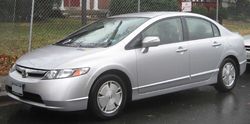
Production 2005–present Model years 2006–2011 Engine Gasoline: 1.3 L LDA series I4 SOHC
Electric: 156 volt 15 kWTransmission CVT Wheelbase 106.3 in (2,700 mm) Length 2006-08: 176.7 in (4,488 mm)(USDM)
2009: 177.3 in (4,503 mm)
2006-08: 4,540 mm (178.7 in)(JDM)Width 69.0 in (1,753 mm) Height 56.3 in (1,430 mm) Curb weight 2,877 lb (1,305 kg)(USDM)
1,260 kg (2,778 lb)(JDM)Related Honda Civic Main article: Honda Civic (eighth generation)The second generation Civic Hybrid is based on the eighth generation Civic. As with other Civics, there are some styling differences between the North American and the Japanese market models.[citation needed]
Design
The powertrain of the second generation Civic hybrid is similar to that of the first generation.
The following is a list of major changes:
- Updated to fourth generation Integrated Motor Assist (IMA)
- more powerful electric motor of 20 hp.
- 158.4 V (132 x 1.2 V) Nickel-metal hydride batteries with 5.5 A·h capacity that is 12% smaller.
- Updated to three stage i-VTEC and VCM (Variable Cylinder Management), which permits deactivation of all four cylinders when cruising at moderate speed to run on electric power only. Engine output is increased to 93 hp (69 kW) at 6,000 rpm and maximum torque to 89 ft·lb at 4,500 rpm.
- Combined output of both engine and electric motor is 110 hp at 6,000 rpm. Maximum torque is rated 123 ft·lb at 2,500 rpm.
- A new hybrid compressor for the air-conditioner.
- The continuous variable transmission provides a 9% wider range between the maximum and minimum gear ratios for better acceleration and reduced engine rpm at high speeds.
- Discontinued manual transmission option.
- The U.S. EPA fuel economy estimate is increased to 49 mpg (US) city, 51 mpg (US) highway.[13] (In 2008: EPA revised the way it estimates fuel mileage,[14] as a result, the EPA rating for the 2008 model is: 40 mpg (US) city, 45 mpg (US) highway).
- Updated to 15-inch lightweight aerodynamic alloy wheels (later featured on the Civic DX-G in Canada as well).
- Certified as AT-PZEV throughout 50 states.
By using high-performance magnets and high-density windings, Honda is able to increase the power output of the electric motor by 50% to 20 hp at 2,000 rpm when compared with the first generation. The inverter that controls motor speed is integrated with the motor's ECU for more precise control, resulting in greater efficiency and fuel economy. The output of battery is increased by around 30 percent to 158.4 V. The battery storage box is designed for better cooling performance and vibration resistance to enhance long-term reliability. The higher output of electric motor enables the car to run on electricity only, at a steady 15 to 20 mph when cruising on a flat surface.
An internal electric motor is added to the air-conditioner, so it can be powered by either the engine, an electric motor, or both. At a stop, the compressor powered by the battery keeps the cabin cool. An additional compressor that is powered by the petrol engine also engages if rapid cooling is required. When the interior temperature is stable, air conditioning is provided by the battery solely. As soon as the brake pedal is lifted, the petrol engine comes back to life again.
The new three stage i-VTEC valvetrain has low-rpm, high-rpm and cylinder idle mode. High output valve timing help the engine to increase its output by 9 percent. During deceleration, the engine is kept idle. There are no combustion in all four cylinders and the cylinders are sealed shut, reducing pumping losses by engine. As a result, recovery of energy wasted during braking is improved by 10 percent.
A digital display is incorporated in the instrument dash showing how much electricity is sent to the battery or how much is used. When the car is braked moderately, maximum number of green LEDs light up showing energy recaptured. When the car is braked harder, the conventional brakes are activated.
Car and Driver found the car, when compared with previous generation, faster, offered greater refinement, quieter at highway speed, has a stiffer body and a revised suspension that handles bumps better and quietly.
Fuel economy
It is estimated that, when compared to a gasoline engine only Civic sedan of 2006 with an automatic transmission, the Civic hybrid provides an increase of fuel economy in city driving of about 63 percent and an increase of fuel economy in highway driving of about 27 percent.[15]
Market reception
The Civic hybrid ranks as the second best selling electric hybrid car in the U.S.[1]
Cost of ownership
Consumer Reports ran an article in April 2006 stating that hybrid vehicles would not pay for themselves over 5 years of ownership. However, there was an error in the calculation of depreciation for the hybrid vehicles. It resulted in overstating how much extra money the hybrids would cost their owners during the first five years of ownership.[16] When corrected, the Honda Civic Hybrid did have a payback period of slightly less than 5 years.[17] In October 2010 Vincentric performed a hybrid cost of ownership analysis for USA market. In this analysis it compared hybrid's 5 year cost of ownership to their all gas counterparts. The analysis showed that 2010 Honda Civic Hybrid costs an additional $1830 dollars over a 2010 Honda Civic EX 2D Coupe with an Automatic Transmission (the report assume 15,000 miles are driven annually and fuel prices are based on a weighted average over the five months prior to October 2010).[18][dead link]
In August 2010, Autoblog reports that a replacement battery for Civic hybrid retails at $2,100.[19]
Other markets
The Civic hybrid was introduced to Malaysia in August 2007.[20] It was launched in China in November 2007 and in India in June 2008.[21]
24 Hours Nürburgring
Honda Civic Hybrid has competed in 24 Hours Nürburgring in 2007, finished in 108th. The twenty-four hours race around the Nürburgring, one of the world's most grueling courses. To race successfully in that course is considered a testament to the capability of Civic's hybrid powertrain.[22]
Awards and recognition
- 2006 North American Car of the Year, along with the rest of the Civic range[23]
- 2006 Motor Trend Car of the Year award, along with the rest of the Civic range.[citation needed]
- 2006 Automotive Journalists Association of Canada (AJAC) Award for Alternative Power Vehicle.[citation needed]
- 2006 Winner of the World Green Car[24]
Third generation (2011- )
Main article: Honda Civic (ninth generation)The Civic Hybrid, launched in 2011 in the U.S. and Canada as a 2012 model year, has a larger 1.5-liter i-VTEC engine and a lithium-ion battery pack instead of nickel-metal hydride. The 2012 Civic Hybrid delivers a combined EPA rating of 44 mpg-US (5.3 L/100 km; 53 mpg-imp) for both city and highway driving cycle, an improvement from 40 to 43 mpg-US (5.9 to 5.5 L/100 km; 48 to 52 mpg-imp) city/highway for the previous model.[25]
It comes with improved aerodynamics and Honda ECO Assist technology.[26] The ECO Assist technology is an information system to help the driver adopt a more fuel-efficient driving style,[27] and is proven to improve fuel economy by about 10% for Honda's hybrid vehicles in Japan.[28]
The hatchback version of the Civic Hybrid is under the development, said to be released in 2011 or 2012 to replace its sedan version, which is very unpopular in Europe.[29]
Sales
Cumulative Sales by Region (as of the end of January 2009)[30] Region Start of Sales Cumulative Sales Japan Dec 2001 22,899 North America Mar 2002 191,493 Europe May 2003 34,757 Asia/Oceania Feb 2004 5,514 China Nov 2007 280 Others May 2006 306 Total 255,249 It is reported that over 50,000 Civic hybrids were sold during 2007 world-wide.[31]
References
- ^ a b "Alternative Fuel Vehicles (AFVs) and Hybrid Electric Vehicles (HEVs)". U.S. Dept of Energy-Alternative Fuels and Advanced Vehicles Data Center. http://www.afdc.energy.gov/afdc/data/vehicles.html. Retrieved 2010-08-01. Click and open the Excel file for the detail by year for each hybrid model (Sales 1999-2009)
- ^ "Honda Reaches 300,000 Units in Cumulative Global Sales of Hybrid Vehicles" (Press release). Honda Motor Co.. 2009-02-18. http://world.honda.com/news/2009/4090218Hybrid-Vehicles/. Retrieved 2010-01-14.
- ^ Honda Announces the New Civic Hybrid Sedan --- The World's Most Fuel-Efficient 5-Seater Production Gasoline Vehicle
- ^ Civic Hybrid First Hybrid Vehicle To Earn Advanced Technology Partial Zero Emissions (AT-PZEV) Status
- ^ EPA fuel estimate 2003 Civic hybrid
- ^ 2002 Honda Civic Overview
- ^ 2003 Honda Civic hybrid
- ^ Honda Creates New IMA System For 2003 Civic Hybrid
- ^ 2003-05 Honda Civic hybrid
- ^ "2003 Honda Civic Hybrid". Ars Technica. http://arstechnica.com/old/content/2002/07/2003-civic-hy.ars/4.
- ^ Green Autos In the Showroom, But Few on the Road
- ^ Greenest 2003 Cars and SUVs
- ^ 2006 Honda Civic Hybrid EPA Ratings
- ^ New MPG Ratings
- ^ From i-VTEC® to iPod®, the All New 2006 Honda Civic Brings the Latest Technology Into the Mainstream
- ^ Consumer Reports (7 March 2006). "Consumer Reports Revises Financial Analysis In Report on Ownership Costs for Hybrid Cars". Consumers Union. Archived from the original on 2007-09-21. http://web.archive.org/web/20070921103910/http://www.consumerreports.org/cro/cu-press-room/pressroom/archive/2006/04/eng0604ehv.htm. Retrieved 2007-04-27.
- ^ "The dollars & sense of hybrid cars". http://www.consumerreports.org/cro/cars/new-cars/high-cost-of-hybrid-vehicles-406/overview/index.htm.
- ^ Vincentric. "Hybrid Comparison". http://vincentric.com/home/industryReports/HybridsvstheirAllGasSiblingVehicles/HybridComparison/tabid/632/Default.aspx?tid1=35623&tid2=35932. Retrieved 2011=02-01.
- ^ Sam Abuelsamid (2010-08-16). "Honda's fix for Civic hybrid batteries". Auto Blog. http://www.autoblog.com/2010/08/16/hondas-fix-for-prematurely-dying-civic-hybrid-batteries-hurting/. Retrieved 2010-08-16.
- ^ Civic Hybrid Fast Gaining Acceptance. . Honda Malaysia. 2009-06-26. http://www.honda.com.my/newsevents/news/details.dot?inode=21144.
- ^ "Honda begins sales of all-new Insight dedicated hybrid vehicle". Honda Motor Co. Worldwide site. http://world.honda.com/Hybrid/.
- ^ y Wayne Cunningham (2007-09-11). "Civic Hybrid completes 24-hour race". cnet Reviews. http://reviews.cnet.com/8301-13746_7-9775512-48.html.
- ^ "Honda Sweeps 'North American Car and Truck of the Year' Awards 2006 Honda Civic and 2006 Honda Ridgeline Take the Top Honors" (Press release). Honda Motor. 2006-01-08. http://world.honda.com/news/2006/4060108COTYTOTY/.
- ^ 2006 Honda Civic Hybrid Wins 'World Car of the Year Award' for Greenest Car
- ^ Christopher Jensen (2011-09-23). "Keeping Hybrid Weirdness at Bay". The New York Times. http://www.nytimes.com/2011/09/25/automobiles/autoreviews/honda-keeps-hybrid-weirdness-at-bay.html?_r=1&ref=automobiles. Retrieved 2011-09-25.
- ^ "New 2012 Honda Civic lineup boosts fuel economy in all models; Hybrid and HF offer 40+ mpg". Green Car Congress. 2011-02-18. http://www.greencarcongress.com/2011/02/honda-20110218.html#more.
- ^ "Honda Civic Si Concept coupe and Civic Concept sedan debut at NAIAS; hybrid and natural gas variants". Green Car Congress. 2011-01-12. http://www.greencarcongress.com/2011/01/civic-20110112.html.
- ^ "Honda Study Finds Insight’s Eco Assist System Results in Average 10% Improvement in Fuel Economy After 300 Drives, Up to 20% Max". Green Car Congress. 2010-02-12. http://www.greencarcongress.com/2010/02/honda-study-finds-insights-eco-assist-system-results-in-average-10-improvement-in-fuel-economy-after.html.
- ^ "SPIED: Honda Civic Hatch Prototype with Full Hybrid System Snagged Testing". Carscoop. 2010-08-03. http://carscoop.blogspot.com/2010/08/spied-honda-civic-hatch-prototype-with.html.
- ^ "Honda Reaches 300,000 Units in Cumulative Global Sales of Hybrid Vehicles" (Press release). Honda Motor Co. Ltd. 2009-02-18. http://world.honda.com/news/2009/4090218Hybrid-Vehicles/. Retrieved 2010-08-02.
- ^ Hiroko Nakata (2008-07-06). "Toyota leads charge for new 'green' power source". Japan Times. http://search.japantimes.co.jp/cgi-bin/nn20080706f4.html. Retrieved 2010-07-22.
External links
- Honda's Civic Hybrid page
- Honda Civic Hybrid official UK site
- 2006 Motor Trend Car of the Year - Honda Civic
« previous — Honda road car timeline, 1980s–present 1980s 1990s 2000s 2010s 0 1 2 3 4 5 6 7 8 9 0 1 2 3 4 5 6 7 8 9 0 1 2 3 4 5 6 7 8 9 0 1 kei truck
MicrovanActy/Street Acty/Street Acty/Vamos Kei car Today Today Life/Honda Z Life/Zest Life/Zest Subcompact City/Jazz City City/Logo/Capa Fit/Jazz/City/Aria/Mobilio Fit/Jazz/City/Aria/Freed Ballade Ballade Concerto Domani Civic Civic Civic Civic Civic/Orthia/Partner Compact Quint Civic/EL Civic/CSX Accord Accord/Vigor Accord/Vigor Accord Accord/Ascot Mid-size Accord/Ascot Accord/TL/TSX Inspire/Vigor Inspire/Saber/Rafaga Inspire/Saber/Torneo Inspire/Accord Insight Full-size Inspire/Accord Legend Legend Legend/RL Legend/RL Legend/RL Coupé CRX CRX del Sol Insight CR-Z Integra Integra Integra Integra Prelude Prelude Prelude Prelude Prelude Sports Beat S2000 NSX Mini SUV HR-V Crossroad Compact SUV Passport Compact Crossover SUV Element CR-V CR-V CR-V/RDX Mid-size CUV Crossroad Pilot Pilot Luxury CUV MDX MDX Compact MPV S-MX Edix/FR-V Stream Stream Avancier Airwave/Partner Minivan Stepwgn Stepwgn Stepwgn Odyssey Odyssey/LaGreat Odyssey Odyssey Odyssey (JDM) Odyssey (JDM) Odyssey (JDM) Elysion Pickup Ridgeline Honda road car timeline, North American market, 1980s–present Type 1980s 1990s 2000s 2010s 0 1 2 3 4 5 6 7 8 9 0 1 2 3 4 5 6 7 8 9 0 1 2 3 4 5 6 7 8 9 0 1 2 Subcompact Insight Civic Civic Civic Civic Civic Fit Fit Compact Insight Accord Accord Accord Accord Civic Civic Civic Mid-size Accord Accord Accord Accord Coupe Crosstour Full-size Accord Sedan Coupe Prelude Prelude Prelude Prelude Prelude Sport compact CR-X CR-X del Sol CR-Z Sports car S2000 SUV Element CR-V CR-V CR-V CR-V Passport Passport Pilot Pilot Pickup truck Ridgeline Minivan Odyssey Odyssey Odyssey Odyssey Categories:- Honda Civic
- Euro NCAP small family cars
- Hybrid electric cars
- Partial zero-emissions vehicles
- Sedans
- Hatchbacks
- Vehicles with CVT transmission
- Front wheel drive vehicles
- Vehicles introduced in 2001
Wikimedia Foundation. 2010.

